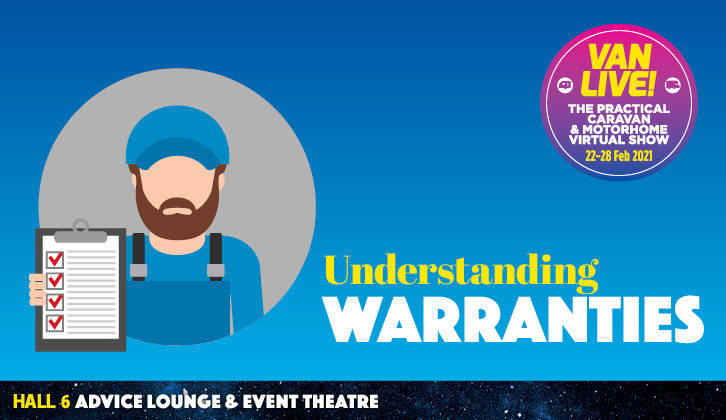“I’m thinking about buying a brand new motorhome, and the dealer says that it comes with a warranty. It’s just like a guarantee, right?”
Not exactly. The Consumers’ Association says guarantees are mainly focused on whether the product lives up to your expectations, and are free. Warranties, on the other hand, are more like an insurance policy, and are often not free, particularly if you opt for an extended one.
The main thing to remember is that a warranty should have no impact on your consumer rights. As NCC deputy director general Alicia Dunne says: “The simple rule is, a warranty can add to a consumer’s rights, but can’t take them away.”
NCC consumer rights adviser Peter Stonely takes this further: “A seller’s liability is for the lifetime of the goods, or six years (five years in Scotland), whichever is shorter, and the warranty cannot restrict this.”
That’s particularly important if you feel you have to reject the motorhome because it turns out to be far from what you had been promised. You have an ‘early right to reject’ within 30 days of taking possession of the vehicle.
If a fault develops, the dealer does have an opportunity to carry out a repair; but if the same or another fault develops within those 30 days, you still have a ‘final right to reject’ – and the clock stops ticking while the ‘van is at the dealer’s.
Alicia Dunne points out that, because the motorhome industry relies so heavily on spare parts coming from abroad, a ‘reasonable time’ to carry out a repair might be longer than in other industries – especially now with the Covid-19 lockdowns.
But if you do exercise your final right to reject within six months of receiving the motorhome, you should get a full refund. After that, it might still be possible, although the seller has the right to make a reduction for the use of the goods.
So a warranty should make no difference to your rights as a consumer. Where it could come in handy is in repairs going on after this initial period. The Consumers’ Association says that a warranty can give you more protection in the case of accidental damage.
How does a warranty work?
Warranties provided by manufacturers in general offer to repair any defects without cost to you as the consumer – with certain exceptions and provided that certain conditions are met.
But it’s not quite that simple. A motorhome almost always features a base vehicle made by one company and the conversion provided by a separate firm. That means you have two warranties: one for the base vehicle and a body shell warranty for the conversion.
Large components in the motorhome, such as the microwave, or the heater, will usually have their own warranties, too.
More modern motorhomes also have a specific water-ingress warranty, which lasts longer than the body shell warranty, often up to a decade. These can be extended warranties, which are optional, but which you have to pay for. And it’s because you have to pay for them that the Consumers’ Association says such warranties are more like an insurance policy.
Finally, your dealer might also offer you their own warranty, particularly if you are buying a used model. These are organised by them through a separate insurer, and are far more varied, so it’s not really wise to generalise about them here.
This all sounds complicated! Can’t I just assume most standard manufacturer warranties are going to be pretty much the same?
No, you can’t and you shouldn’t. In fact, while researching this article, we have been surprised at how varied warranties offered by different manufacturers are – even now.
For example, buy a new Auto-Trail motorhome and you should be offered a warranty that covers repairs and replacement of fittings for five years from the date of registration (although some restrictions apply).
There is also a body-integrity warranty (in effect, a water-ingress warranty) that lasts for the same period as standard, although, provided you are the first registered keeper, at the point of sale you can buy a five-year extension to it.
Buy a new Auto-Sleeper motorhome, meanwhile, and you get a three-year habitation warranty, plus an extra three years for water ingress, giving you six years in total.
Interestingly, the Caravan and Motorhome Club asks its Motorhome Design Awards judges to include warranties offered on each entered model in the judging process. They are assessed for their duration, flexibility (whether they can be extended) and complexity (what the buyer needs to do to be in compliance). You shouldn’t assume, however, that warranties from Continental manufacturers are much different to those offered by UK companies. Adria, Chausson and Pilote, for example, all offer a two-year body components warranty, while Adria offers 10 years for water ingress, Chausson seven years and Pilote five.
Caravan and Motorhome Club technical manager Martin Spencer says that you probably will get a better warranty if you buy from a larger manufacturer, but this has nothing to do with quality. “I suspect it’s more down to the ability of larger producers to negotiate terms with warranty insurance providers,” he explains.
There are also differences in warranties offered by base vehicle manufacturers. For new vehicles, Fiat offers a two-year warranty with three years of breakdown cover, while with Ford, it’s a three-year warranty but only one year of breakdown cover.
Peugeot offers a two-year unlimited-mileage warranty, which can extend into a third year, provided you don’t go over 100,000 miles on the mileometer. There is also a three-year paint warranty for all vehicles registered after 1 January 2019 (two years for vehicles before this date) and a five year anti-perforation warranty.
With Volkswagen, the warranty depends on the model. For the Crafter, it is unlimited mileage for three years. For the Transporter, it is three years or 100,000 miles, whichever is the shorter. It is just possible that if you buy your T6 conversion new and go touring flat out, you might exceed 100,000 miles before three years are up.
With Mercedes, the standard warranty is two years. You might hear that Sprinter and Vito models produced for the UK market have three years, but ‘produced for the UK market’ means a lot more than, say, having right-hand drive.
Such vehicles are required to have a 537 sales code. Your dealership should be able to tell you if yours does, but essentially, this means that if you are buying a Marco Polo, you should get a three-year warranty, but any other Mercedes conversion will only get two years.
No matter which brand you go for, you should read all of the small print very carefully when buying a motorhome that’s covered under warranty, to check exactly what you’re getting.
OK, but I can definitely rest assured that the warranty will cover most things, right?
The warranty should cover major problems with your motorhome, but there are usually exceptions. Quite often, for example, while the warranty period might run for, say, three years, elements within your ‘van might only be covered for a shorter time.
That Auto-Trail warranty, for example. could run for a period of five years, but any defects in the doors, locks and handles will only be covered for nine months from the date of registration, and defects in the GRP will only be repaired free of charge for the first year.
Similarly, Erwin Hymer UK offers a three-year warranty on all models produced after 2012, but windows and glass, audio-equipment and exterior GRP panels are excluded from year two.
Many water-ingress warranties will also only cover non-opening seals. For example. Bailey’s six-year body-integrity warranty only covers degradation caused by water ingress through “permanently sealed windows or joints”.
So that non-opening roof light might be OK, but you could find yourself in slightly trickier territory if the leak happens to come from one that does open.
There are also plenty of exceptions to the base vehicle warranty, which is probably only to be expected, given the changes that might have been made to it during the conversion.
Mercedes-Benz, for example, requires all conversions to have been carried out within its guidelines for the warranty to apply. If any parts of the conversion need to be removed for access to the base vehicle, the cost of removing them and putting them back afterwards will not be covered by the warranty.
You might also invalidate the warranty by the way in which you use your motorhome. You will almost certainly do so if you hire out your vehicle, and you could also invalidate it if you take the ‘van abroad for more than 90 consecutive days.
This is something to bear in mind if you have dreams of spending next winter in your new vehicle on a Spanish beach!
To keep your warranty valid, you usually have to commit to putting your vehicle through a regular motor and habitation service – generally speaking, once every 12 months.
Martin Spencer believes many owners are, perhaps understandably, reluctant to do this. “Base vehicle warranties tend to be geared around an assumption of a higher annual mileage than most motorhomes actually achieve, and that means warranty-supporting servicing might be required at relatively modest mileage increments. While such servicing is almost certainly sensible to pick up on ageing and deterioration, it’s not always seen as such by owners,” he says.
The Covid-19 pandemic has knocked this system about a bit. Almost every manufacturer has extended the time limit for when you need to get the work done – some more than others, or more explicitly than others. But given the continuing nature of the pandemic, it is always worth checking on an individual basis with your manufacturer or dealer about your ‘van.
Can’t I just get all of this servicing carried out by the garage down the road?
No. It either has to be done at a workshop approved by the base vehicle manufacturer, or carried out by the conversion company.
It doesn’t necessarily have to be done at the dealership you bought the motorhome from. But do bear in mind that the rate dealers are paid by manufacturers for warranty work is almost always less than what they would charge conventionally, so they might not be clamouring for it.
In addition, bear in mind that while the warranty might cover the repair, the cost of actually getting the motorhome to the workshop will almost always have to be borne by you. That could be quite steep if the vehicle is undriveable.
So is it worth buying an extended warranty?
Hard selling of extended warranties that you have to pay for – not just in motorhomes, but elsewhere as well – has perhaps given them something of an underserved bad press.
Martin Spencer thinks this is unwarranted. He says, “Any extension is often related to water ingress. New construction methods should in theory limit the need for that as outfits age, but I’m not sure the evidence is there to confirm that’s the case as yet.” So go for one if you can.
If I were to buy a used motorhome, would it still have a warranty?
Yes, if you decide to purchase a pre-owned model, it might well come with a warranty. If you sell a motorhome before the warranty period is ended, it is usually possible to transfer the warranty to the new owner. However, you have to let the manufacturer know that you are doing so, and the seller will usually have to pay a fee. As a buyer, you need to check this has been done.
Dealers might also offer their own warranties on used models. As with everything else, these do need reading over carefully.
So, in general, would you say warranties are worth it?
Absolutely – and they have improved over the years. You can see clearly how they have improved on Swift’s website, as the company lists the different warranties it has applied to model years dating all the way back to 2012.
There might have been extensions to the exceptions along the way, some brought about by changes in suppliers, but the trend is definitely positive.
Martin Spencer certainly thinks warranties have helped to improve general standards in motorhomes – although possibly not as much as they have in caravans.
As an example of this, Swift has started offering lifetime warranties for some of its caravans – models that have been built using its SMART 3 construction system. But the new system has not yet been extended to motorhomes, so 25-year warranties do not apply to them at present.
For motorhome owners, Martin Spencer thinks that the question of having two warranties – one for the base vehicle, and another for the conversion – is always going to be ‘somewhat problematic’. And here at Practical Motorhome, we have heard stories about motorcaravanners getting tangled up in disputes between different companies over who is actually responsible for the repair – disputes that have in some cases led to the motorhome simply not going anywhere.
But in general, Martin thinks that the case has been proven: “Overall, warranties are better than they used to be, especially in terms of duration. They are definitely worth having.”
This article is based on information in September/October 2020 and is intended as a general overview of common warranty questions. References to specific products are for illustration only and not intended as recommendation.
You’re in Hall 6 Advice Lounge & Event Theatre at Van Live! Spring 2021. See what else is happening on stage, or take me to the Show Guide.









